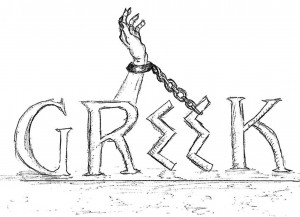Cornell rape case is a grim reminder of systemic greek sexual assault
Since President Barack Obama’s launch of the It’s On Us campaign to combat the national epidemic of campus sexual assault in 2014, the issue has developed into a series of discussions on campuses nationwide. The “1 in 5” statistic — that one in five college-aged women will be sexually assaulted — has become regularly cited evidence of the pervasiveness of campus sexual assault. So when Wolfgang Ballinger, the president of Cornell’s Psi Upsilon fraternity, was arrested and charged with attempted rape, it highlights only one of many incidents of sexual violence within greek life. Eliminating this violence altogether comes from acknowledging that greek life plays an integral part in sexual violence on campus.
Every year, there seems to be a new national story of fraternity misogyny, whether it’s chants of “No means yes, yes means anal” at Yale, a Texas Tech fraternity hanging a banner with the same slogan or the Wesleyan “rape factory” case. Defenders of greek life may excuse these as isolated incidents of a few bad eggs, but the statistics of sexual violence in greek life paint a disturbing picture. According to a study in the Journal of Interpersonal Violence, fraternity brothers are three times more likely to rape a woman than non-greeks, and according to the National Institute of Justice, there is a correlation between sorority membership and the likelihood of sexual assault. A University of Oregon study concluded that greek women were a shocking 3.4 times as likely to suffer rape or attempted rape than their non-greek counterparts. Though campus sexual assault is not a uniquely greek issue, numerous studies make it clear that greek life is a significant factor in perpetuating sexual violence on campus. Despite this fact, greek life is rabidly defended.
Fraternity apologists leap to point out the “good guys” in frats, the charity work done by both fraternities and sororities and the leadership opportunities within the greek system. This is all true. Of course the majority of fraternity brothers don’t commit violent felonies, and of course many of them are ”good guys.” When confronted with the statistics of sexual violence in greek life, however, arguments about the amount of “good guys” in frats become meaningless. Pointing toward philanthropy or leadership opportunities in greek life is only a distraction; the good side of greek life does not make the dark side any less troubling. The thought of a national sexual assault epidemic can seem distant, but in truth, it is an especially serious issue at USC.
In a study of 27 top U.S. schools, including every Ivy League university other than Princeton, USC had the second highest rate of sexual assault. According to a campus climate survey, 30 percent of Trojan women are sexually assaulted during their time at USC. A 2008 USC study found that greek women were more than twice as likely to suffer attempted rape than non-greek women. These results are appalling, especially for a university that prides itself on its Trojan family.
USC is an excellent institution, and greek life has much to offer, but both must address their shortfalls by strengthening programs to curtail widespread sexual assault. Emory University’s greek sexual assault prevention initiative, for example, aims to increase bystander intervention and sexual assault awareness within the greek community. At USC, the Intrafraternity Council, which held WE CARE, the USC Greeks Stand Against Sexual Violence program, last April, should reimplement the program during Sexual Assault Awareness Month this year.
USC should also implement stronger punitive measures and find new, safer venues for greek parties. Fewer than one third of students found guilty of sexual assault are expelled, and harsher punishments could deter this crime. Furthermore, lifting the national ban on alcohol in sorority houses could relocate parties to sorority houses, which would be safer for women.
The increased visibility of college sexual assault as a national epidemic is a victory for victims everywhere, and it is an injustice to deny the disproportionate role greek life has played in this epidemic. Of course, college sexual violence at USC and elsewhere spreads far beyond the Row, and it is naive to assert that reforming greek culture is the only change needed on campus. Addressing the violence in greek life, however, is an important part of reforming a culture conducive to sexual misconduct as a whole.


If anything… This isn’t another “sad example of rape culture”… It’s most certainly another sad example of the rush to judgement in order to vilify men and most likely another sad example of a woman who regretted her behavior and threw someone else under the bus to wash her hands of it. It’s sad, pathetic, and men everywhere are getting tired of it. Myself: I refuse to be alone with a female I don’t trust with my life…. Because all she has to do is cry and be anointed victim status… And down you go with almost zero recourse. Sad.